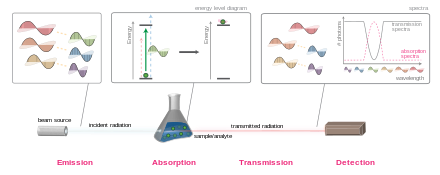
Back امتصاص (كهرومغناطيسي) Arabic বিশোষণ (তড়িৎচৌম্বক বিকিরণ) Bengali/Bangla སིམ་ཞུགས། Tibetan Absorció (electromagnetisme) Catalan Absorpce záření Czech Lichtabsorption German Optika sorbo Esperanto Absorción (óptica) Spanish Valguse neeldumine Estonian جذبش (تابش الکترومغناطیس) Persian
This article includes a list of general references, but it lacks sufficient corresponding inline citations. (November 2010) |

In physics, absorption of electromagnetic radiation is how matter (typically electrons bound in atoms) takes up a photon's energy—and so transforms electromagnetic energy into internal energy of the absorber (for example, thermal energy).[1]
A notable effect of the absorption of electromagnetic radiation is attenuation of the radiation; attenuation is the gradual reduction of the intensity of light waves as they propagate through the medium.
Although the absorption of waves does not usually depend on their intensity (linear absorption), in certain conditions (optics) the medium's transparency changes by a factor that varies as a function of wave intensity, and saturable absorption (or nonlinear absorption) occurs.
- ^ Baird, Christopher S. (September 2019). "Absorption of electromagnetic radiation". AccessScience. McGraw-Hill. doi:10.1036/1097-8542.001600. Retrieved 17 June 2023.